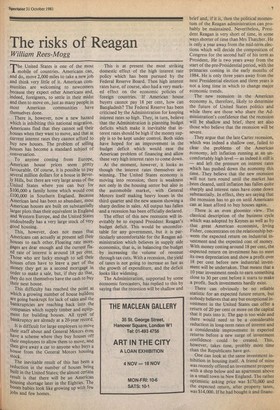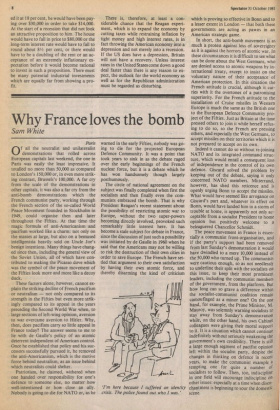The risks of Reagan
William Rees-Mogg
The United States is one of the most mobile of countries. Americans can, and do, move 2,000 miles to take a new job and think very little of it. American communities are welcoming to newcomers because they expect other Americans and, indeed, foreigners, to settle in their midst and then to move on, just as many people in most American communities have themselves done.
There is, however, now a new hazard which is inhibiting this national migration. Americans find that they cannot sell their houses when they want to move, and that at current interest rates they cannot afford to buy new houses. The problem of selling houses has become a standard subject of conversation.
To anyone coming from Europe, American house prices seem pretty favourable. Of course, it is possible to pay several million dollars for a house in Beverly Hills, but there are very large areas of the United States where you can buy for $100,000 a family home which would cost £100,000 in Southern England. Because American land has been so abundant, most American houses are built on substantially larger plots than their equivalent in England and Western Europe, and the United States undoubtedly has a very large stock of very good housing.
This, however, does not mean that Americans can actually at present sell their houses to each other. Floating rate mortgages are dear enough and the current fixed rate of interest is around 18 per cent. Those who are lucky enough to sell their houses often have to leave a part of the money they get as a second mortgage in order to make a sale, but, if they do that, they do not themselves have the cash to buy their next house.
This difficulty has reached the point at Which a growing number of house builders are going bankrupt for lack of sales and the bankruptcies are reaching back into the Companies which supply timber and equipment for building houses. All types of bankruptcy are already at a 20-year record.
It is difficult for large employers to move their staff about and General Motors even have a scheme where they buy houses off their employees to allow them to move, and then give away a car to anyone who buys a house from the General Motors housing stock.
The inevitable result of this has been a reduction in the number of houses being built in the United States; the almost certain result is that there will be an American housing shortage later in the Eighties. The boom babies look like growing up with few Jobs and few homes. This is at present the most striking domestic effect of the high interest rate policy which has been pursued by the Federal Reserve Board. Then high interest rates have, of course, also had a very marked effect on the economic policies of foreign countries. If American house buyers cannot pay 18 per cent, how can Bangladesh? The Federal Reserve has been criticised by the Administration for keeping interest rates so high. They, in turn, believe that the Administration is planning budget deficits which make it inevitable that interest rates should be high if the money supply is to be kept under control. Both sides have hoped for an improvement in the budget deficit which would ease the American problem of financing and allow these very high interest rates to come down.
At the moment, however, it looks as though the interest rates themselves are winning. The United States economy is moving into recession; there is weakness not only in the housing sector but also in the automobile market, with General Motors itself making heavy losses in the third quarter and the new season showing a sharp decline in sales. All output has fallen and a recession has been officially declared.
The effect of this new recession will inevitably be to expand President Reagan's budget deficit. This would be uncomfortable for any government, but it is particularly uncomfortable for the Reagan administration which believes in supply side economics, that is, in balancing the budget by increasing the volume of revenue through tax cuts. With a recession, the yield of taxes is not going to increase as fast as the growth of expenditure, and the deficit looks like widening.
The Administration, supported by some economic forecasters, has replied to this by saying that the recession will be shallow and brief and, if it is, then the political momentum of the Reagan administration can probably be maintained. Nevertheless, President Reagan is very short of time, in some ways shorter of time than Mrs Thatcher. He is only a year away from the mid-term elections which will decide the composition of Congress for the second half of his term as President. He is two years away from the start of the pre-Presidential period, with the primaries coming in the early months of 1984. He is only three years away from the next Presidential election and three years is not a long time in which to change major economic trends.
The new recession in the American economy is, therefore, likely to determine the future of United States politics and while there are those who share the Administration's confidence that the recession will be shallow and brief, there are also those who believe that the recession will be severe.
They argue that the late Carter recession, which was indeed a shallow one, failed to clear the problems of the American economy, left inflation running at an uncomfortably high level — as indeed it still is — and left the pressure on interest rates which has pushed down the economy this time. They believe that the new recession will not turn round until the market has been cleared, until inflation has fallen quite sharply and interest rates have come down substantially. In effect, they are saying that the recession has to go on until Americans can at least afford to buy houses again.
There is an even gloomier view. The classical description of the business cycle which was adopted by Keynes as well as by that great American economist, Irving Fisher, concentrates on the relationship between the expected return on industrial investment and the expected cost of money. With money costing around 18 per cent, the expected return on investment has to meet its own depreciation and show a profit over 18 per cent before new industrial investment will be undertaken. That means that a 10 year investment needs to earn something close to 30 per cent before it starts to make a profit. Such investments hardly exist.
There can obviously be no reliable statistic for an expected future return, but nobody believes that any but exceptional investment in the United States can offer a return of 20 per cent or more on the capital that it puts into it. The gap is too wide and there would need to be a considerable reduction in long-term rates of interest and a considerable improvement in expected returns before a new surge of investment confidence could be created. This, however, takes time, probbly more time than the Republicans have got.
One can look at the same investment inhibition in housing itself. A friend of mine was recently offered an investment property with a shop below and an apartment above in a small town in New England. The rather optimistic asking price was $170,000 and the expected return, after property taxes, was $14,000. If he had bought it and financ ed it at 18 per cent, he would have been paying over $30,000 in order to take $14,000. At the start of a recession that did not look an attractive proposition to him. The house would have to fall in price to $80,000 or the long-term interest rate would have to fall to round about 81/2 per cent, or there would have to be a doubling of the rent or an acceptance of an extremely inflationary expectation before it would become rational to invest in such a proposition. There must be many potential industrial investments which are equally far from showing a profit. There is, therefore, at least a considerable chance that the Reagan experiment, which is to expand the economy by cutting taxes while restraining inflation by tight money and high interest rates, is in fact throwing the American economy into a depression and not merely into a recession. If the US does have a depression, Britain will not have a recovery. Unless interest rates in the United States come down a good deal faster than there is any reason to expect, the outlook for the world economy as well as for the Republican administration must be regarded as disturbing.







































 Previous page
Previous page